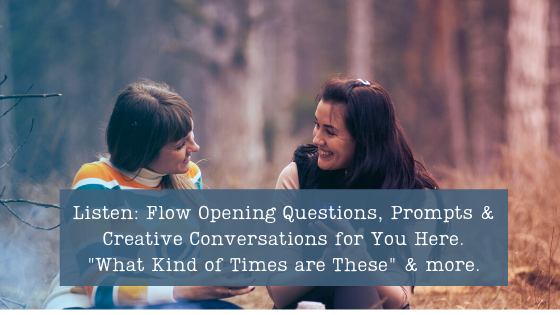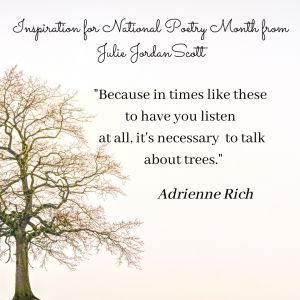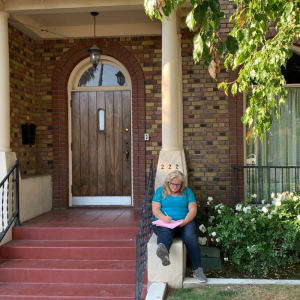
There are a lot of people who are writing poetry during National Poetry Month. This is something I do – and while I am not keeping up with producing a poem a day – it is more like a torrent of poems every few days – my reading of poetry is what is fueling me quite intensely as of late.

In bringing you into my poetry sanctuary – in quarantine times especially I feel more than a bit vulnerable. Speaking that aloud first makes me feel slightly more open to share with you this unfurling process this week as you may choose to step into it, too, to gain an understanding of both yourself, your loved ones and your world.
So far this morning I livestreamed Adrienne Rich’s poem, “What Kind of Times are These” twice, on Instagram and Periscope. Each time I read this poem aloud more turns of phrase and meaning slowly or not-so-slowly rise up to greet me.
Now, it is time to consider how the words of Adrienne Rich and the prompts I am providing may rise up to greet you in your creativity, in your contemplation and in your conversations.
Consider:
Where is your sacred space to listen and to be heard?
Where is your sacred space to listen during this time of quarantine?
Who are the people who will listen to you from their own place of sacred listening?
You may contemplate these questions, discuss them with your friends or on the pages of your notebook or journal. You may also watch the replay of the livestream video on twitter:
Now, a writing prompt to take on your way, without concern for what poet Adrienne Rich had to say or not.
Consider and then reflectively write, free flowing style – to the prompt –
What kind of times are these? and/or
These are the times when…..
If you are not in the space to write, have a conversation with a friend or spend some time in contemplation.
In the future, these time will be a memory you will be asked to remember and talk about with others. These are the times you may still shape these next few weeks.
What will you do to shape these times with hope, light and inspiration?

Julie JordanScott is the Creative Life Midwife. She inspires people to live their life as an artform and take action towards their best results. During the 2020 Pandemic she is also leading daily Virtual Coffee Dates, Facilitating Intentional Conversation so people will feel less isolated during this time of social and physical distancing. Join the conversation by registering for free by clicking this link.
Like the maid who doesn’t do windows, I’m the writer who doesn’t write poetry. I do like to read it occasionally though, and definitely appreciate the writing prompts you shared in this post.
Let me know what comes up with the writing prompts. I often use the prompts I write on myself and they’re bringing a lot up for me.
My blog post today is an example of how I react and share my humour or insight.
My favourite poets from high school days were Ogden Nash for his limericks and Robert Frost. I struggled in English class to keep my head above water. (Sea level) I hated the questions like: “What do you think the author had in mind when he wrote this”. Especially when I wrote what I thought, then was marked poorly for what I thought. More likely for not expressing well what I thought. In reality, I had no idea what they thought. I could only read what they wrote and took it at face value.
In one remedial class that I was in to try to upgrade my mark, we listened to an interview with Robert Frost. The interviewer asked Robert what he was feeling when he wrote the poem “After Apple Picking”. The study materials and Cole’s Notes talked about all kinds of ideas that they had “picked out” or “read into” the space between the lines of the poem. I felt much better when I heard Robert reply that he was feeling tired from picking apples all day. Nothing more, no esoteric thoughts, just feeling tired and writing a poem to relax.
I’m grateful to report I never ask that question, I ask questions like “what resonates” and “how do you respond?”
I enjoy when people reflect back the meaning of my work to me as a visual artist or as a poet or as an actor. Usually their interpretations are miles from what I was thinking or feeling and I am grateful for that! Poetry comes alive when it is read, especially read aloud… without attachment to results or outcomes regarding meaning.
I get upset when people who teach poetry believe there is a right or a wrong like that horrid textbook in “Dead Poet’s Society” – poetry is NOT about anyone’s brilliance – not the poet or the reader alone. It is about when the person reading in that precise moment feels something. And it may be tired after a long day at work and somehow writing (or reading) a brief poem brings peace.
This so much describes my early attempts concerning reading/writing. I only knew (know) if I like(d) it or not. I know if it flows well, or not. Thanks for making me feel more normal.
I’m not a writer per say but every now and then I put a poem together. I actually have on for tomorrow’s post.. Usually something just pops in my head when I working or just hanging around and I take it from there.
A Jewish person is required to “perfect the world” every single day. Whether it’s helping one person do or feel something or offering a small piece of the effort to improve the condition of multitudes. Of course, when one is under house arrest, the opportunities require more searching and more creativity. But, it’s still done.
Loved your prompt to provide light, hope, and inspiration.
Thank you, Roy. Using the prompts helps me, too. I woke up feeling so much better. SOOO much better.
Thank you Julie. One more time you’ve hit the mark.
Thank you so much, Deb! I’m grateful you read and took time to let me know!